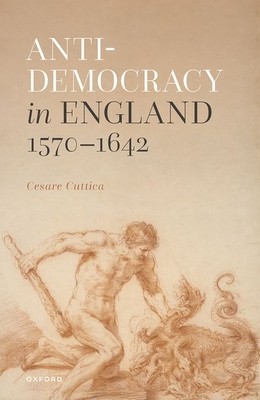
- We will send in 10–14 business days.
- Author: Cesare Cuttica
- Publisher: Oxford University Press, USA
- ISBN-10: 0192866095
- ISBN-13: 9780192866097
- Format: 16.4 x 23.8 x 2.1 cm, hardcover
- Language: English
- SAVE -10% with code: EXTRA
Reviews
Description
Anti-democracy in England 1570-1642 is a detailed study of anti-democratic ideas in early modern England. By examining the rich variety of debates about democracy that took place between 1570 and 1642, it shows the key importance anti-democratic language held in the late Tudor and early Stuart periods. In particular, it argues that anti-democratic critiques were addressed at 'popular government' as a regime that empowered directly and fully the irrational, uneducated, dangerous commonalty; it explains why and how criticism of democracy was articulated in the contexts here under scrutiny; and it demonstrates that the early modern era is far more relevant to the development of democratic concepts and practices than has hitherto been acknowledged. The study of anti-democracy is carried out through a close textual analysis of sources often neglected in the history of political thought and by way of a contextual approach to Elizabethan, Jacobean, and Caroline history. Mostimportantly, the study re-evaluates the role of religion and cultural factors in the history of democracy and of political ideas more generally. The point of departure is at a time when the establishment and Presbyterians were at loggerheads on pivotal politico-ecclesiastical and theoretical matters; the end coincides with the eruption of the Civil Wars. Cesare Cuttica not only places the unexplored issue of anti-democracy at the centre of historiographical work on early modern England, but also offers a novel analysis of a precious portion of Western political reflection and an ideal platform to discuss the legacy of principles that are still fundamental today.
EXTRA 10 % discount with code: EXTRA
The promotion ends in 7d.00:17:31
The discount code is valid when purchasing from 10 €. Discounts do not stack.
- Author: Cesare Cuttica
- Publisher: Oxford University Press, USA
- ISBN-10: 0192866095
- ISBN-13: 9780192866097
- Format: 16.4 x 23.8 x 2.1 cm, hardcover
- Language: English English
importantly, the study re-evaluates the role of religion and cultural factors in the history of democracy and of political ideas more generally. The point of departure is at a time when the establishment and Presbyterians were at loggerheads on pivotal politico-ecclesiastical and theoretical matters; the end coincides with the eruption of the Civil Wars. Cesare Cuttica not only places the unexplored issue of anti-democracy at the centre of historiographical work on early modern England, but also offers a novel analysis of a precious portion of Western political reflection and an ideal platform to discuss the legacy of principles that are still fundamental today.


Reviews